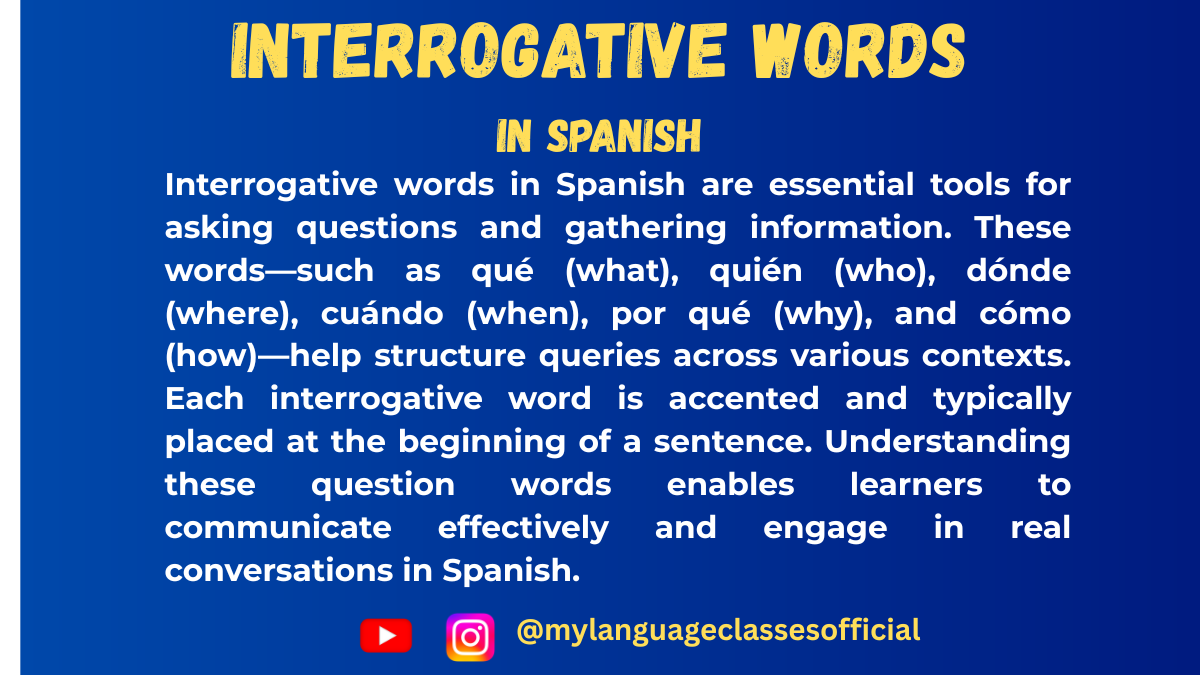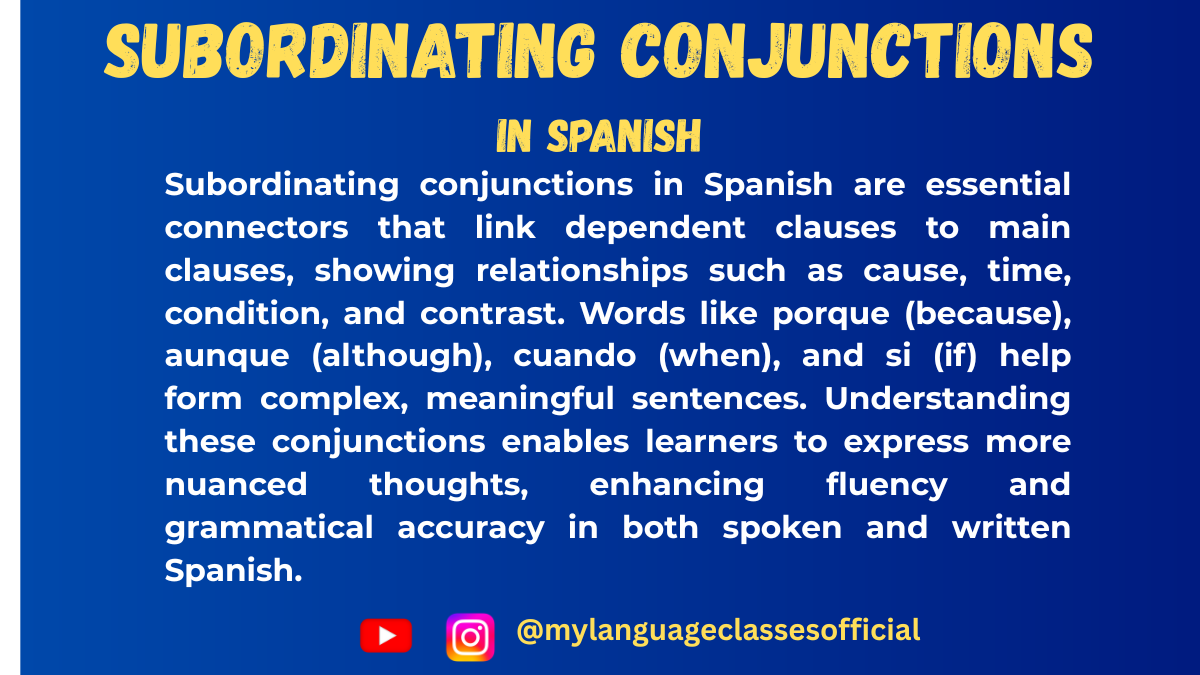Your cart is currently empty!
Tag: how to use qué in Spanish
-

Questions with Interrogative Words in Spanish
Asking questions in Spanish is an essential skill for effective communication. Spanish has various interrogative words that help in forming questions. In this blog, we will cover common interrogative words such as “qué,” “quién,” “cuándo,” “dónde,” “por qué,” “cómo,” “cuánto,” and others. We will also explore their meanings, usage, and structure in different grammatical contexts.
Common Interrogative Words and Their Meanings
Below is a list of the most frequently used interrogative words in Spanish, along with their meanings:
Interrogative Word Meaning Qué What Quién Who Quiénes Who (plural) Cuándo When Dónde Where Por qué Why Cómo How Cuánto How much Cuánta How much (feminine) Cuántos How many (masculine) Cuántas How many (feminine) Cuál Which Cuáles Which (plural) How to Form Questions with Interrogative Words
- Sentence Structure: In Spanish, the interrogative word usually appears at the beginning of the question. The verb generally follows immediately after the interrogative word.
- Example: ¿Dónde está el libro? (Where is the book?)
- Use of Articles:
- In some cases, definite or indefinite articles are needed before the noun.
- Example: ¿Qué es el amor? (What is love?)
- Singular vs. Plural:
- “Cuánto” changes based on gender and number.
- Example: ¿Cuántos libros tienes? (How many books do you have?)
- Example: ¿Cuántas hermanas tienes? (How many sisters do you have?)
- Gender Agreement:
- Some interrogative words change based on gender.
- Example: ¿Cuánto dinero tienes? (How much money do you have?)
- Example: ¿Cuánta agua bebes? (How much water do you drink?)
Beginner and Intermediate Level Interrogative Words with Examples
Interrogative Word Example Sentence 1 Example Sentence 2 Qué ¿Qué quieres comer? (What do you want to eat?) ¿Qué es esto? (What is this?) Quién ¿Quién es él? (Who is he?) ¿Quién viene a la fiesta? (Who is coming to the party?) Cuándo ¿Cuándo es tu cumpleaños? (When is your birthday?) ¿Cuándo llegas? (When are you arriving?) Dónde ¿Dónde vives? (Where do you live?) ¿Dónde está mi mochila? (Where is my backpack?) Por qué ¿Por qué estás triste? (Why are you sad?) ¿Por qué estudias español? (Why do you study Spanish?) Cómo ¿Cómo estás? (How are you?) ¿Cómo funciona esto? (How does this work?) Cuánto ¿Cuánto cuesta? (How much does it cost?) ¿Cuánto tiempo tenemos? (How much time do we have?) More Example Sentences
- ¿Cuáles son tus colores favoritos? (Which are your favorite colors?)
- ¿Cuánta agua bebes al día? (How much water do you drink per day?)
- ¿Dónde compraste ese vestido? (Where did you buy that dress?)
- ¿Por qué no viniste ayer? (Why didn’t you come yesterday?)
- ¿Cómo llegaste aquí? (How did you get here?)
- ¿Qué tipo de música te gusta? (What type of music do you like?)
- ¿Cuándo comienza la película? (When does the movie start?)
- ¿Cuántos amigos tienes? (How many friends do you have?)
- ¿Cuál es tu comida favorita? (Which is your favorite food?)
- ¿Quiénes son esos niños? (Who are those kids?)
Fill in the Blanks
- ¿______ es tu profesor? (Who is your teacher?)
- ¿______ vives? (Where do you live?)
- ¿______ cuesta esta camisa? (How much does this shirt cost?)
- ¿______ vienes a la escuela? (When do you come to school?)
- ¿______ quieres comer? (What do you want to eat?)
- ¿______ estudias español? (Why do you study Spanish?)
- ¿______ hermanos tienes? (How many siblings do you have?)
- ¿______ estás? (How are you?)
- ¿______ son tus zapatos? (Which are your shoes?)
- ¿______ trabaja en esa oficina? (Who works in that office?)
Answers
- Quién 2. Dónde 3. Cuánto 4. Cuándo 5. Qué 6. Por qué 7. Cuántos 8. Cómo 9. Cuáles 10. Quién
Things to Keep in Mind
- Always use an accent (tílde) on interrogative words.
- Adjust the verb conjugation according to the subject.
- Ensure gender and number agreement.
- Some questions require context for clarity.
Conclusion
Mastering interrogative words in Spanish is key to effective communication. Practice these structures and soon, asking and answering questions in Spanish will become second nature!
If you enjoyed this lesson, be sure to check out more posts like this on my blog at My Language Classes. Don’t forget to subscribe my YouTube channel and follow me on Instagram for the latest language learning tips and lessons. Leave a comment below to share your thoughts, or ask any questions you have.
Happy learning! 😊
- Sentence Structure: In Spanish, the interrogative word usually appears at the beginning of the question. The verb generally follows immediately after the interrogative word.
-

Subordinating Conjunctions in Spanish: porque, que, cuando, aunque, and Others
Subordinating conjunctions in Spanish are essential for connecting clauses, providing reasons, expressing conditions, and indicating time. These conjunctions introduce subordinate clauses, which depend on the main clause to complete their meaning. Understanding their usage will significantly improve your fluency in Spanish.
List of Common Subordinating Conjunctions and Their Uses
Below is a list of the most commonly used subordinating conjunctions in Spanish along with their meanings and examples:
Conjunction Meaning Example 1 Example 2 porque because No salí porque llovía. (I didn’t go out because it was raining.) Estudio mucho porque quiero aprobar. (I study a lot because I want to pass.) que that Me dijo que vendría. (He told me that he would come.) Creo que es una buena idea. (I think that it is a good idea.) cuando when Te llamaré cuando llegue. (I will call you when I arrive.) Cuando era niño, jugaba mucho. (When I was a child, I played a lot.) aunque although/even though Aunque está lloviendo, saldré. (Even though it is raining, I will go out.) Lo haré aunque no tenga ganas. (I will do it even if I don’t feel like it.) si if Si estudias, aprobarás. (If you study, you will pass.) Iré si tengo tiempo. (I will go if I have time.) como as/since Lo hice como me dijiste. (I did it as you told me.) Como hace frío, me pondré un abrigo. (Since it is cold, I will wear a coat.) porque because No fui porque estaba enfermo. (I didn’t go because I was sick.) Lo hicimos porque era necesario. (We did it because it was necessary.) mientras while/as long as Puedes quedarte mientras quieras. (You can stay as long as you want.) Mientras yo cocino, tú pones la mesa. (While I cook, you set the table.) para que so that Te lo explico para que lo entiendas. (I explain it to you so that you understand.) Trabajo duro para que mis hijos tengan una mejor vida. (I work hard so that my children have a better life.) hasta que until No saldrás hasta que termines la tarea. (You will not go out until you finish your homework.) Esperaré hasta que llegues. (I will wait until you arrive.)
More Example Sentences
- No me gusta que llegues tarde. (I don’t like that you arrive late.)
- Como no tenía dinero, no compré nada. (Since I had no money, I didn’t buy anything.)
- Siempre me llama cuando necesita ayuda. (He always calls me when he needs help.)
- Aunque hace frío, no llevo abrigo. (Although it is cold, I am not wearing a coat.)
- Si tienes hambre, come algo. (If you are hungry, eat something.)
- Se quedó hasta que terminó la película. (He stayed until the movie ended.)
- Te hablo despacio para que me entiendas. (I speak slowly so that you understand me.)
- Mientras yo limpio, tú organizas la mesa. (While I clean, you organize the table.)
- Me gusta que me ayudes. (I like that you help me.)
- No salgas hasta que te llame. (Do not go out until I call you.)
Fill in the Blanks
- No saldré ______ termine mi tarea.
- Te lo explico ______ lo entiendas.
- ______ estudies, no aprenderás.
- Me dijo ______ vendría.
- Saldré ______ haga calor o frío.
- Esperaré ______ llegues.
- ______ no vengas temprano, perderemos el tren.
- No me gusta ______ me hables así.
- Comeré ______ tenga hambre.
- Salimos temprano ______ no había tráfico.
Answers
- hasta que
- para que
- Si no
- que
- aunque
- hasta que
- Si
- que
- cuando
- porque
Things to Keep in Mind
- Word Order: In Spanish, subordinating conjunctions typically introduce the subordinate clause, which follows the main clause.
- Verb Tense: Some conjunctions require the use of the subjunctive mood, especially when expressing uncertainty, purpose, or conditions (e.g., “para que” requires the subjunctive: “para que me entiendas”).
- Gender and Plurality: Conjunctions themselves do not change based on gender or plurality, but the words around them do. Make sure the verbs and adjectives agree with the subject.
- Use of Articles: Articles (el, la, los, las) do not affect subordinating conjunctions, but they must agree with the nouns they accompany.
- Common Mistakes: Beginners often confuse “porque” (because) with “por que” (for which) and “por qué” (why). Understanding their differences is crucial.
Conclusion
Mastering subordinating conjunctions in Spanish is essential for fluency, as they help create complex and meaningful sentences. Whether expressing reasons, conditions, or time, these conjunctions enhance communication and improve sentence structure. By practicing with real-life examples and exercises, you can become more confident in using them correctly. Keep practicing and incorporating these into daily conversations to strengthen your command of Spanish!
If you enjoyed this lesson, be sure to check out more posts like this on my blog at My Language Classes. Don’t forget to subscribe my YouTube channel and follow me on Instagram for the latest language learning tips and lessons. Leave a comment below to share your thoughts, or ask any questions you have.
Happy learning! 😊
